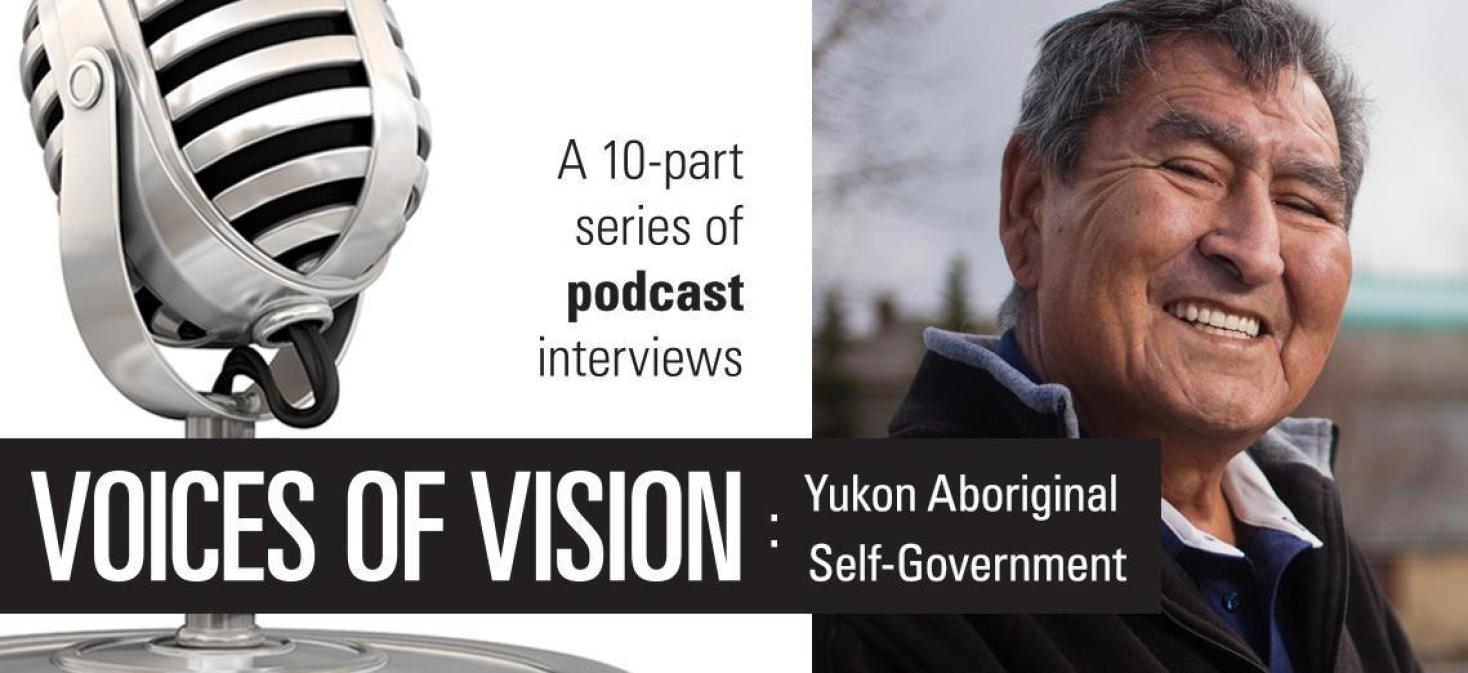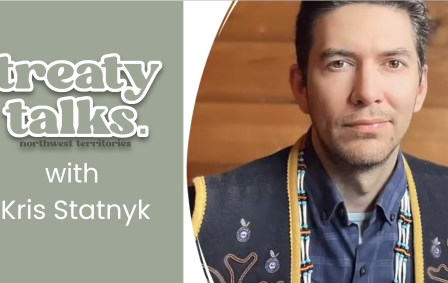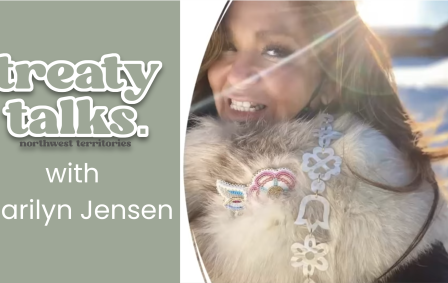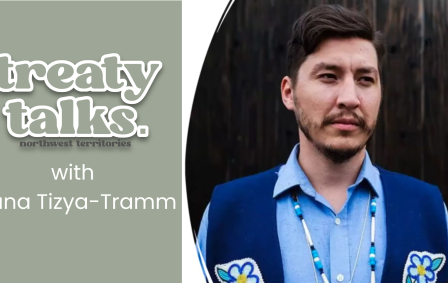Voices of Vision: An interview with Robert Hager

Robert Hager grew up following traditional pursuits such as hunting, fishing and trapping. As a citizen of the First Nation of Nacho Nyak Dun, Robert was proud of his First Nation's history of self-government. His passion for self-government was one of the key aspects of his long and fulfilling political career. Robert was Chief of the First Nation of Nacho Nyak Dun for three decades, and in that time, Robert witnessed several milestones of Yukon First Nation self-government, including the signing of his First Nation's Final and Self-Government Agreements.
Robert Hager passed away in May 2016 and is warmly remembered as a trailblazing leader in the negotiation of the Yukon agreements. Read more about his life and accomplishments in the following articles:
http://www.cbc.ca/news/canada/north/robert-hager-dead-nacho-nyak-dun-1.3591887
http://yukon-news.com/news/trailblazing-chief-robert-hager-remembered/
http://www.whitehorsestar.com/News/late-chief-helped-bring-about-self-government
Consult the glossary of terms used in the Voices of Vision podcasts.
Back to Voices of Vision podcast series
Transcript
00:00:00
MEAGAN PERRY (VOICE OVER): Robert Hager was Chief of the First Nation of Nacho Nyak Dun for 30 years. He was there to witness two of the most important moments in developing the Yukon's unique version of modern-day aboriginal self-government. Hager was there in 1973 when a delegation of Yukon First Nation leaders presented a groundbreaking proposal to Prime Minister Pierre Trudeau. It was titled: Together Today for our Children Tomorrow. The organization that presented the document evolved over the years and is now the Council of Yukon First Nations, or CYFN. Hager was also present at the signing of the Umbrella Final Agreement, the UFA, which sets a basic template for self-government and land claims agreements in the Yukon.
Hager left his post as Chief shortly after signing his First Nation self-government agreement. By signing that agreement, he changed his First Nation's relationship with the Department of Indian and Northern Affairs, which Hager calls the D.I.A. He's been watching Nacho Nyak Dun put that agreement into practice in daily life since then. In February of 2011 Robert Hager agreed to sit down at his home in Mayo, Yukon, 400 kilometers north of Whitehorse, for an interview. We talked about the history of aboriginal self-government, land claims agreements, and his First Nation. I'm Meagan Perry, and I started by asking him to introduce himself.
ROBERT HAGER: My name is Robert Hager. I was born in 1941 and I've been involved in being a Status Indian, raised up in the village. I was raised up by the First Nation people. My father and mother are Status Indian. They are really the self-government people. And I lived in the old village three miles below Mayo, and we moved to Mayo in 1957. That's because of the year the school opened for our First Nation – first time ever we were allowed to go to public school and that's why we moved to Mayo.
MEAGAN PERRY: For people who aren't familiar, for people who might be listening to this podcast from places in other parts of Canada or outside of Canada, can you describe the village of Mayo? What does it look like?
ROBERT HAGER: Mayo is – it's by the Stewart River. It was built there because there was – lead, silver and zinc was found underneath the ridge out from United Keno Hill. They've been operating since 1898. So the mining, that's why Mayo was created.
MEAGAN PERRY: Now as a young person what was it that sparked your interest in land claims and self-government?
ROBERT HAGER: I was a very young man when I lived in the village. I came from about 14 in the family. The village is just a little town. We had no employed. We all lived on hunting and fishing and trapping. But we do have our own self-government of people controlling how we live and how the Chief had control the people of what to do and how to make things easier for the whole village.
MEAGAN PERRY: And so when you first were – I was speaking with Hal Mehaffey. You remember him?
ROBERT HAGER: Yes.
MEAGAN PERRY: Hal Mehaffey was talking about working with Nacho Nyak Dun just as self-government was just being negotiated.
00:03:45
ROBERT HAGER: Oh, so you're spying on me, eh?
[laughter]
MEAGAN PERRY: And he said that he thought that self-government could really improve things for Nacho Nyak Dun. Do you think that's true?
ROBERT HAGER: Well, when I first became a Chief we were under Indian Affairs. Indian Affairs was controlling our life. Indian Affairs was providing – they started providing social assistance and all that stuff and people had no choice but to take those social assistances because their kids were put in school and they have to live by something. So that meant that a lot of our people didn't give up trapping, but the trapping couldn't provide enough food on the table when you have to feed two families, like when your kids have to go to school and then you have to go out and trap. So a lot of our people started looking for jobs. And then what really happened is that the government had opened up liquor for our people. I remember I was just 16 or 17 years old when that happened but I've never seen anything like it, and that's where people lost the control of their life.
MEAGAN PERRY: Before that you weren't allowed to buy liquor, right? Is that true?
ROBERT HAGER: Yeah, you were not allowed to buy any liquor, you were not allowed to drink, and you were not allowed to vote, you were not allowed to – according to the Indian Act you were not allowed to put money in the bank. You were not allowed to do anything. You were not allowed to go to public school unless you franchised yourself to give up your Status right to go to a public school. I thank God my dad never gave that up just for education. But today that's why I'm still a Status Indian.
MEAGAN PERRY: When Elijah Smith started bringing self-government ideas here, what was your reaction?
00:06:16
ROBERT HAGER: Well I – as a young person I grew up being involved in hunting and fishing and trapping. I see the life of how people live. I work hard to be where I wanted to be because I see a lot of the things that are happening, not rightful for our people. Oh, I used to just hate Indian Affairs, how they worked with our people. And many times, many times I think to myself someday things are going to change. And then those days, they came.
MEAGAN PERRY: Talk to me about Together Today for our Children Tomorrow. How were you involved with that document?
ROBERT HAGER: Well I understand – I think a lot of people know – there is a Status Indian, there is the Non-Status Indian. So when I was a Chief it took me a long time to really accept the Non-Status – to really understand where they were really coming from. And they put CYFN together to really look at the Non-Status and the Status working together. And we know that it's not going to work out because the government doesn't accept Non-Status whatsoever. Until today it's still the same issue.
MEAGAN PERRY: And that issue is that the federal government provides services to people who are registered as Status Indians, and people who aren't registered as Status Indians don't get the same services, so it was making administration difficult?
ROBERT HAGER: Yes.
MEAGAN PERRY: So you were Chief of Nacho Nyak Dun for 30 years.
ROBERT HAGER: Yes.
MEAGAN PERRY: That's a long time.
ROBERT HAGER: Yeah, it is.
MEAGAN PERRY: And during that time you worked to create self-government and then implement self-government. How did the challenges change for Nacho Nyak Dun when you moved from negotiating your self-government agreement to implementing your self-government agreement?
00:09:02
ROBERT HAGER: When it was first – mind you, I'll go back a little bit – in the '84 agreement, I went against the '84 agreement, against 16 other Chiefs. I'm not really too happy with what they're negotiating on the table.
MEAGAN PERRY: And was that the Umbrella Final Agreement at that point? What agreement was it?
ROBERT HAGER: No, it wasn't Umbrella. It was [Together] Today for our Children Tomorrow to come to a first land claims agreement. And what I didn't agree with is because we were going to have to give up our Status to be a Non – I always call it a "white little Indian boy". That's what I would have been. I would lose my Status, and the agreement was what I was really against, that '84 agreement. And all my people were behind me. We went to that meeting. They put us first on the agenda thinking that they can override us, that we have nothing to back us up. And now a lawyer read out some of the problem with the agreement and then one thing he brought out, he says, "Well, you Indian people, you wouldn't be allowed to shoot any big game outfit and animal like grizzly bear and sheep and big moose horn and all that stuff." This one Elder guy from Carcross, he was a game outfitter before. His name is Johnnie Johns. He got up and he said, "What did you say?" And he said that you're not allowed to be a big game outfit as this agreement. He said, "The heck with that," he said. He picked up all his paper and threw it right in the garbage. And pretty soon the whole people started agreeing with him. So that's how we beat that '84 agreement. Then after that the Prime Minister came up to me, he said, "Well, Robert. You got rid of their agreement. So now you're going to go way down the bottom of the list." And I said – I think it was John Turner. I said, "You know what?" I told him, "I've still got my Status right," I told him. "I can live under your Indian Act but I still have my Status," I told him. "It's going to take you a long time to take that away," I told him. So with that the whole thing, they shut down. Oh people just hated me for killing that agreement. But it didn't matter to me. My people were happy.
MEAGAN PERRY: And so once you had signed – you worked on the Umbrella Final Agreement and you were happy with it? Were you happy with it?
ROBERT HAGER: A lot happier than what we normally did being underneath DIA. You know, when I hated DIA I said it's not the people it's just the system – the name of DIA, how they controlled the Indian people. When I left the Chief in 1997 I didn't run my term. I told the people that I had enough of it and I think we got things rolling for the people. Now self-government means that you've got to work hard to put it together. It's not an easy, easy government you're going to have. You're going to work hard. And that's how I had left. I left being the Chief.
MEAGAN PERRY: When you signed the self-government agreement for Nacho Nyak Dun, what were your expectations at that point?
00:13:43
ROBERT HAGER: Well I couldn't feel any better than anything in the world that I knew what our people were going to go through. Lots of Elders had talked to me about where this self-government is going to go. They told me that they were our self-government. They were controlling everything because there were people understandable, people working together, but we're going to have lots of trouble with self-government because of there's a lot of drinking, there's lots of drugs, and lots of child welfare and all that stuff. But we have to get the right people, resource people, to put this self-government together for us. So that means we've got to work hard to put the self-government together. I understand it, what they're talking about. But they told me you be really careful of where this is going to go. You were underneath the Indian Affairs. You don't have no control. But now you joined the other Non-Status and you people are going to lose out again if you guys don't work together and control your money and do it rightfully. You got to work both together to make it happen, otherwise your Status people are going to lose out again.
MEAGAN PERRY: How does it feel to look back on all those years you worked for self-government negotiations and implementation? What do you think about when you think about those years?
ROBERT HAGER: Well I think about it a lot. The one thing I didn't do is I didn't set up a good pension plan for myself. I didn't – I was – I don't know why is that. I think I always thought financial people would put those things in place. But I look back at it and I always tell my wife, I say, "Christine, I should have worked for the territorial government on the Highway. I would have a big pension plan. I would have everything what I needed. I would be big and fat and heavy duty." But she says – I love my wife for this – she says, "You work hard, you put things together for the people, and people love you for that. You don't understand it but a lot of people make a good comment about you." And she's right. And you know the one time this Mayo and Indian people, there was really, really a lot of discrimination, lots of teachers, RCMP had lots of hatred for the Native people. You know my Council and I, we all worked hard. And I talked to this one guy from the village of Mayo. Him and I, we had quite a bit of discussion of how we can put joint council together as a non-Native and Native people. And that's how we put joint council with the village of Mayo and that's where it all started from. Mind you, not only me did it. The whole Council, we worked hard towards that. So we made sure our people would sit in the school board and we said we'll make sure our people are involved in all decision-making. So it worked really well.
MEAGAN PERRY: What's your proudest moment in self-government? Through all the negotiations and the implementation, do you have something that you are really proud of?
00:18:53
ROBERT HAGER: Well what I was thinking when I held up the agreement: "Say goodbye Indian Affairs, hello self-government." That was my happy moment.
[laughter]
MEAGAN PERRY: I'll bet. Well thank you for talking to me today.
MEAGAN PERRY (VOICE OVER): That was Robert Hager, former Chief of the First Nation of Nacho Nyak Dun. He spoke to me in February of 2011 about Yukon land claims and self-government. The opinions expressed in this interview are intended to deepen public understanding of the history of land claims and self-government implementation in the Yukon, and represent the opinions and ideas of the interviewee alone. This series of podcasts was produced by the Implementation Working Group, a cooperation between Council of Yukon First Nations, Government of Yukon, Government of Canada, and Self-Governing Yukon First Nations.


